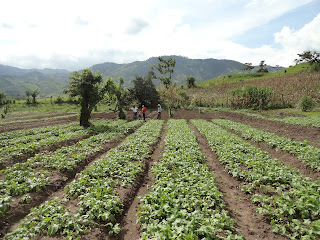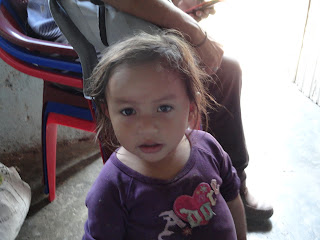There is still a lot of coffee in the fields and I guess that people will be harvesting coffee for a week or two. We’ll probably be spending a day or two soon in the parish coffee fields next week.
But I have also come across coffee bushes in flower. The fragrance of the coffee flowers is one of God’s gifts and you can smell them from a distance. The closest fragrance in the US is honeysuckle.
I have been involved for several years with an association of small coffee growers in the nearby community of El Zapote Dulce Nombre. There are twenty-one members, two of them women. They’ve been exporting some coffee to the US, first through the parish of Saint Thomas Aquinas in Ames and now through a non-profit, El Zapote Coffee. Click for their facebook page. I have independent testimony on the quality.
The association has had some help from veracious non-governmental organizations to help them develop their work. Most recently, a foundation has given them some seed money for setting up their own beneficio, a processing plant. This will enable them to cut costs as well as to lessen the environmental effects of the coffee production process. EL Zapote Coffee is doing some fund-raising to help them.
The association already has some funding and they have worked to prepare the site for the processing and to set up a solar dryer and a one-sided shed. But much more is needed.
It is great to see them working taking and taking the initiative, with very competent leadership.
TOMATOES
Last year, shortly before the pandemic began, a neighbor and his cousin began a tomato project, producing beefsteak tomatoes in a large greenhouse.
Since he could deliver the tomatoes to my house, I enjoyed fresh tomatoes until about October, when the plants needed to be uprooted and new ones planted. I had to endure other tomatoes until the beginning of this year when the new harvest began.
I have been ordering for myself, but several women at the church in Dulce Nombre have been asking me to get some for them. I’m so happy to be able to share them and to support a local farmer.
Friday I had a chance to visit Alex and the tomato greenhouse. It was amazing to see what they are doing. His cousin had learned how to do this in the department of Ocotepeque and the two of them had put together their resources to start the project.
But I was also pleased to see that Alex and his cousin were also cultivating other vegetables in their gardens – garlic, onions, green peppers, mustard, cilantro, squash, cucumber, and more. I hope I can buy some of their produce.
SOLIDARITY
I’ve been connecting a lot these days with a community that was severely affected by Hurricanes Eta and Iota last year.
Many homes were destroyed or severely damaged, About a third of the houses in the community are in precarious situations and could be severely affected when the rainy season arrives.
They’ve formed a board to help consider how to go forward. They hope to have a study made of the geological situation to help determine if they need to relocate the village.
The parish has brought aid to the community several times. This past Wednesday night, a woman from the community called and told me that there had been a fire in the home of an elderly woman and that she had lost clothing, a mattress, and more. The fire came from a defective light fixture. Since the roof was of tin with metal beams, the house itself had not caught fire and so she could continue living there.
I brought a mattress, clothing, and supplies from the parish.
I got another call just before I left the parish asking me to bring a mattress, clothing, and supplies for an older man who had showed up in the village a few weeks ago.
One of the women helped him get washed up and set him up in a room be the church. She told me how the stench was overpowering but she went forward and washed him. He is also rather ill with inflamed stomach and legs. And so the woman and others are raising money to take him to a clinic to have him examined. In their poverty, they have reached out to one who is suffering even more.
They put me to shame.
Providentially, the Gospel for the day I went there was the parable of the rich man and Lazarus, in Luke 16, 19-31.
POLITICS
March 14 the country’s parties will hold internal elections, choosing the candidates for November’s elections for the presidency, congress, and municipal mayors.
I have seen some signs for candidates and once almost got stuck in a caravan of cars in support of one candidate.
One of the most interesting things I’ve seen is a sign for one candidate for the mayor of Concepción about a block away from the house of the other candidate.
It’s also interesting that I know a number of the candidates for various positions and parties. There are even two young men I know who are running for office.
Whether these elections will make any difference remains to be seen. (Excuse the cliché.)
Corruption runs deep in the country and there are rumors of corruption of one presidential candidate. But above all are the continuing stories about the involvement of the current president in drug trafficking. It just so happens that his brother is waiting sentencing in the US.
COVID-19
COVID still afflicts the country. In our rural area, there have not been a lot of cases, though one village seems to have had a serious outbreak. In the aldea where I live, five persons were tested positive but have recuperated.
There were stories from the government that the vaccine would begin to arrive in the second half of February, but the date was changed to March.
According to some news reports about 2000 vaccines have arrived from Israel and have been given to medical personnel. There is some controversy about the protocols but something has begun.
There are also reports that the government is purchasing 4,200,000 Sputnik V vaccines from Russia.
My concerns are that the poorest will be ignored in this.
AND MORE…
The artist is continuing with the murals in the church in Dulce Nombre, most notably in the chapel of the Blessed Sacrament. Our hopes are that he will be able to finish in April.
Holy Week is almost upon us. We are planning to have a session for parish leaders to help them prepare for Holy Week. It will be different from last year, when we were in lockdown, but we will be trying to be responsible as we help communities offer some small gatherings to celebrate the death and resurrection of the Lord – offering hope in the midst of all the suffering the country has suffered in the last twelve months.




































